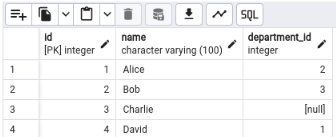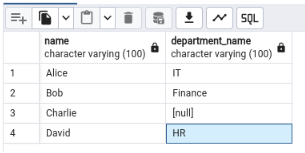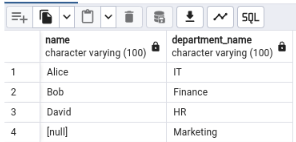SQL is a powerful tool for interacting with relational databases. When working with tables in SQL, you often need to combine data from multiple tables. This is where JOIN operations help. LEFT JOIN and LEFT OUTER JOIN are two commonly used commands. Although they seem different, they actually perform the same function. Let’s understand the working and difference between SQL LEFT JOIN vs. LEFT OUTER JOIN.
Table of contents
- What is a LEFT JOIN?
- What is a LEFT OUTER JOIN?
- SQL LEFT JOIN vs. LEFT OUTER JOIN
- Practical Examples: LEFT JOIN and LEFT OUTER JOIN
- Step 1: Create Database
- Step 2: Create Tables
- Step 3: Insert Data into Tables
- Step 4: Run the Queries
- Conclusion
- Frequently Asked Questions
What is a LEFT JOIN?
A LEFT JOIN is a type of SQL JOIN operation that combines rows from two tables based on a related column. The key feature of a LEFT JOIN is that it returns all rows from the left table and the matched rows from the right table. If there’s no match, the result will include NULL values for columns from the right table.
Syntax
SELECT columns FROM left_table LEFT JOIN right_table ON left_table.column_name = right_table.column_name;
In the above syntax:
- left_table: The primary table from which all rows are returned.
- right_table: The secondary table from which matched rows are returned.
- column_name: The column used to join the two tables.
Example of LEFT JOIN
SELECT employees.name, departments.department_name FROM employees LEFT JOIN departments ON employees.department_id = departments.id;
This query retrieves all employees and their corresponding department names. If an employee is not assigned to any department, the result will show NULL for the department name.
Also Read: Joins In SQL – Inner, Left, Right and Full Joins Explained
What is a LEFT OUTER JOIN?
The LEFT OUTER JOIN operates exactly like the LEFT JOIN. It returns all rows from the left table and the matched rows from the right table. If there’s no match, it returns NULL for columns from the right table. The term “OUTER” is optional and does not change the behavior of the JOIN. It’s often used for clarity in some SQL dialects.
Syntax
SELECT columns FROM left_table LEFT OUTER JOIN right_table ON left_table.column_name = right_table.column_name;
Using the same example as above, we could rewrite our query as follows:
As you can see, the syntax is identical to the LEFT JOIN. The only difference is the inclusion of the word OUTER.
Example of LEFT OUTER JOIN
SELECT employees.name, departments.department_name FROM employees LEFT OUTER JOIN departments ON employees.department_id = departments.id;
This query also retrieves all employees and their corresponding department names, just like the LEFT JOIN. If an employee is not assigned to any department, the result will show NULL for the department name.
Also Read: SQL Guide from Basics to Advance Level
SQL LEFT JOIN vs. LEFT OUTER JOIN
While the termsLEFT JOINandLEFT OUTER JOINmay appear different, they are functionally identical in SQL. The only difference lies in the syntax:
- LEFT JOIN: Shorter and more commonly used.
- LEFT OUTER JOIN: Includes the optional“OUTER”keyword for clarity.
Both commands return the same results, so the choice between them is a matter of personal or organizational preference.
Practical Examples: LEFT JOIN and LEFT OUTER JOIN
To create a sample database with employees and departments tables, and then use the LEFT JOIN and RIGHT JOIN examples, you can use the following SQL commands.
Step 1: Create Database
First, create the database where the tables will reside.
SELECT columns FROM left_table LEFT JOIN right_table ON left_table.column_name = right_table.column_name;
Step 2: Create Tables
Now, let’s create the employees and departments tables.
SELECT employees.name, departments.department_name FROM employees LEFT JOIN departments ON employees.department_id = departments.id;
Step 3: Insert Data into Tables
Now, insert some sample data into both tables:
SELECT columns FROM left_table LEFT OUTER JOIN right_table ON left_table.column_name = right_table.column_name;
Output:

SELECT employees.name, departments.department_name FROM employees LEFT OUTER JOIN departments ON employees.department_id = departments.id;
Output:

Step 4: Run the Queries
Now that the database and tables are created and populated with data, you can run the LEFT JOIN and RIGHT JOIN queries.
LEFT JOIN Query
CREATE DATABASE company_db; USE company_db;
Output:

RIGHT JOIN Query
-- Create the 'departments' table
CREATE TABLE departments (
id INT PRIMARY KEY,
department_name VARCHAR(100) NOT NULL
);
-- Create the 'employees' table
CREATE TABLE employees (
id INT PRIMARY KEY,
name VARCHAR(100) NOT NULL,
department_id INT,
FOREIGN KEY (department_id) REFERENCES departments(id)
);
Output:

When to Use LEFT JOIN or LEFT OUTER JOIN
- Data Retrieval: Use a LEFT JOIN when you need all records from the left table, even if there are no matching records in the right table.
- Reporting: Ideal for generating reports where you want to include all items (e.g., products, employees) regardless of their relationships.
- Data Analysis: Helps identify gaps or missing relationships between datasets.
Conclusion
In summary, both LEFT JOIN and LEFT OUTER JOIN are synonymous terms in SQL that serve the same purpose of combining data from two tables while ensuring that all records from the left table are included in the result set. The choice between using one term over the other often comes down to personal or organizational preference. Understanding this can enhance your efficiency when writing SQL queries and prevent confusion during data manipulation tasks.
Put your SQL knowledge to test with these SQL Projects!
Frequently Asked Questions
Q1. What is the difference between LEFT JOIN and LEFT OUTER JOIN?A. There is no difference.?LEFT JOIN?and?LEFT OUTER JOIN?are functionally identical. The term “OUTER” is optional and used for clarity.
Q2. When should I use a LEFT JOIN?A. Use a?LEFT JOIN?when you need all records from the left table, even if there are no matching records in the right table.
Q3. Does LEFT JOIN include NULL values?A. Yes, a?LEFT JOIN?returns NULL values for columns from the right table when there is no match for a row in the left table.
Q4. Can I use LEFT JOIN and LEFT OUTER JOIN interchangeably?A. Yes, you can use?LEFT JOIN?and?LEFT OUTER JOIN?interchangeably in SQL queries. Both produce the same results.
The above is the detailed content of SQL LEFT JOIN vs. LEFT OUTER JOIN. For more information, please follow other related articles on the PHP Chinese website!

Hot AI Tools

Undress AI Tool
Undress images for free

Undresser.AI Undress
AI-powered app for creating realistic nude photos

AI Clothes Remover
Online AI tool for removing clothes from photos.

Clothoff.io
AI clothes remover

Video Face Swap
Swap faces in any video effortlessly with our completely free AI face swap tool!

Hot Article

Hot Tools

Notepad++7.3.1
Easy-to-use and free code editor

SublimeText3 Chinese version
Chinese version, very easy to use

Zend Studio 13.0.1
Powerful PHP integrated development environment

Dreamweaver CS6
Visual web development tools

SublimeText3 Mac version
God-level code editing software (SublimeText3)

Hot Topics
 From Adoption To Advantage: 10 Trends Shaping Enterprise LLMs In 2025
Jun 20, 2025 am 11:13 AM
From Adoption To Advantage: 10 Trends Shaping Enterprise LLMs In 2025
Jun 20, 2025 am 11:13 AM
Here are ten compelling trends reshaping the enterprise AI landscape.Rising Financial Commitment to LLMsOrganizations are significantly increasing their investments in LLMs, with 72% expecting their spending to rise this year. Currently, nearly 40% a
 AI Investor Stuck At A Standstill? 3 Strategic Paths To Buy, Build, Or Partner With AI Vendors
Jul 02, 2025 am 11:13 AM
AI Investor Stuck At A Standstill? 3 Strategic Paths To Buy, Build, Or Partner With AI Vendors
Jul 02, 2025 am 11:13 AM
Investing is booming, but capital alone isn’t enough. With valuations rising and distinctiveness fading, investors in AI-focused venture funds must make a key decision: Buy, build, or partner to gain an edge? Here’s how to evaluate each option—and pr
 The Unstoppable Growth Of Generative AI (AI Outlook Part 1)
Jun 21, 2025 am 11:11 AM
The Unstoppable Growth Of Generative AI (AI Outlook Part 1)
Jun 21, 2025 am 11:11 AM
Disclosure: My company, Tirias Research, has consulted for IBM, Nvidia, and other companies mentioned in this article.Growth driversThe surge in generative AI adoption was more dramatic than even the most optimistic projections could predict. Then, a
 New Gallup Report: AI Culture Readiness Demands New Mindsets
Jun 19, 2025 am 11:16 AM
New Gallup Report: AI Culture Readiness Demands New Mindsets
Jun 19, 2025 am 11:16 AM
The gap between widespread adoption and emotional preparedness reveals something essential about how humans are engaging with their growing array of digital companions. We are entering a phase of coexistence where algorithms weave into our daily live
 These Startups Are Helping Businesses Show Up In AI Search Summaries
Jun 20, 2025 am 11:16 AM
These Startups Are Helping Businesses Show Up In AI Search Summaries
Jun 20, 2025 am 11:16 AM
Those days are numbered, thanks to AI. Search traffic for businesses like travel site Kayak and edtech company Chegg is declining, partly because 60% of searches on sites like Google aren’t resulting in users clicking any links, according to one stud
 AGI And AI Superintelligence Are Going To Sharply Hit The Human Ceiling Assumption Barrier
Jul 04, 2025 am 11:10 AM
AGI And AI Superintelligence Are Going To Sharply Hit The Human Ceiling Assumption Barrier
Jul 04, 2025 am 11:10 AM
Let’s talk about it. This analysis of an innovative AI breakthrough is part of my ongoing Forbes column coverage on the latest in AI, including identifying and explaining various impactful AI complexities (see the link here). Heading Toward AGI And
 Cisco Charts Its Agentic AI Journey At Cisco Live U.S. 2025
Jun 19, 2025 am 11:10 AM
Cisco Charts Its Agentic AI Journey At Cisco Live U.S. 2025
Jun 19, 2025 am 11:10 AM
Let’s take a closer look at what I found most significant — and how Cisco might build upon its current efforts to further realize its ambitions.(Note: Cisco is an advisory client of my firm, Moor Insights & Strategy.)Focusing On Agentic AI And Cu
 Build Your First LLM Application: A Beginner's Tutorial
Jun 24, 2025 am 10:13 AM
Build Your First LLM Application: A Beginner's Tutorial
Jun 24, 2025 am 10:13 AM
Have you ever tried to build your own Large Language Model (LLM) application? Ever wondered how people are making their own LLM application to increase their productivity? LLM applications have proven to be useful in every aspect






